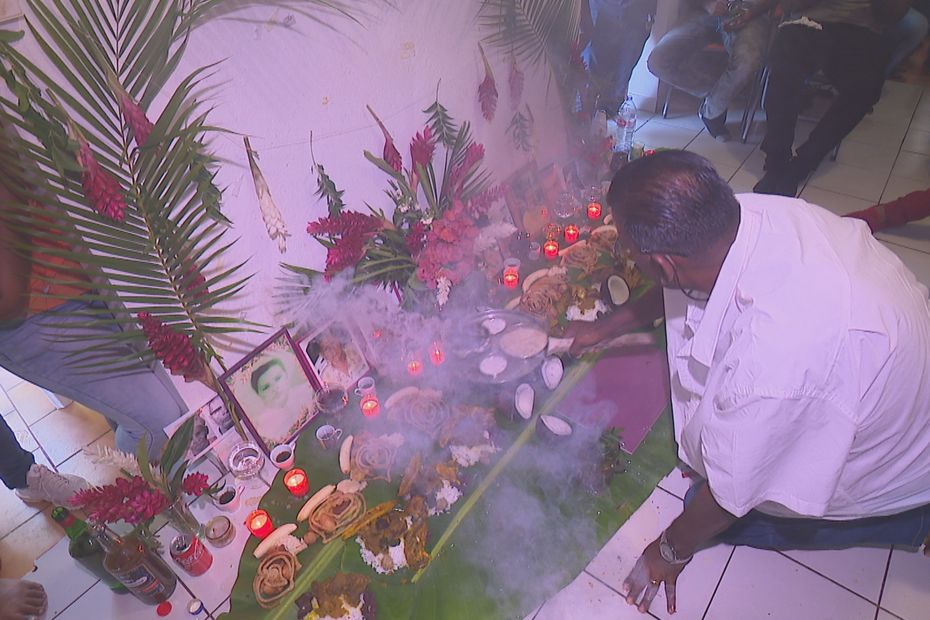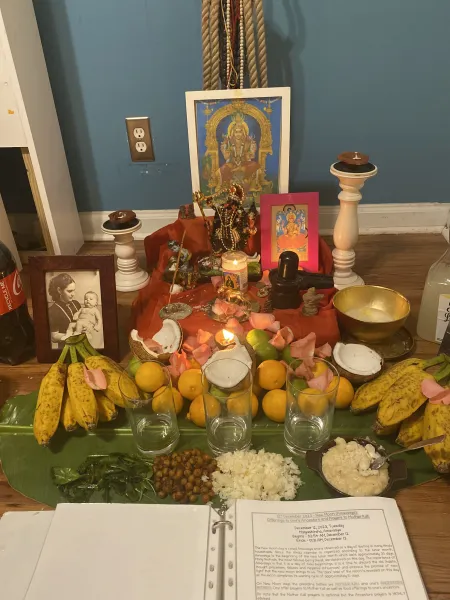The Semblani is a sacred and profound ceremony done on All Saints Day practiced by Tamil Hindus in the French Caribbean to honor their ancestors. This ritual is akin to a vigil and is deeply rooted in the cultural and spiritual traditions of the Tamil community. The ceremony is named after the ritualistic burning of Sambrani, or incense, done to elevate the prayers up to the sky and to set a sacred space to allow the ancestors to watch the Pujai. The Indians who left India after the abolition of slavery brought their traditions to Guadeloupe in their luggage. These traditions have lasted from generation to generation. Among them, there is Samblani, a Hindu festival originating from South India. It is celebrated every year on All Saints Day (another example of syncretization within the Caribbean Sakthi religion) to honor the deceased.
The ceremony is usually hosted at one’s home, where family members and close relatives gather to pay their respects to their departed loved ones. The preparations for Semblani begin well in advance, with the cleaning and decoration of the house to create a sacred space. An altar is set up, adorned with pictures of ancestors, flowers, incense, and offerings of food and sweets. Cigarettes, different beverages, and Balidaan of coconuts and other fruits are also done.
As night falls, the ceremony commences with the lighting of oil lamps and the recitation of mantras. These mantras are chanted to invoke the blessings and presence of the ancestors, inviting them to join the living in this special moment of remembrance. The rhythmic chanting creates a powerful and spiritual ambiance, setting the tone for the evening.
Central to the Semblani is the singing and drumming of the Metalam drum. The Metalam drum, with its deep and resonant sound, is believed to carry the prayers and praises of the participants to the spiritual world. Alongside the drumming, Bhakti Esaiyil or devotional songs are sung. These songs are heartfelt expressions of devotion and gratitude towards the ancestors and deities. The lyrics often recount the deeds and virtues of the ancestors, celebrating their lives and seeking their blessings.
Prayers to Kali and Shiva, revered as the guardians of the dead, hold a significant place in the Semblani. Kali, the fierce and compassionate mother goddess, is invoked to protect and guide the spirits of the ancestors. Her fierce form is seen as a powerful force that can cut through negative energies and provide solace to the departed souls. Shiva, in his aspect as Siva Sangar, is venerated as the lord of the underworld and the ultimate destroyer of evil. His presence in the ceremony signifies the cycle of creation and destruction, embodying the eternal nature of the soul. Sometimes during the ceremony, the passed one is thought to come down and possess one of the devotees.
Throughout the night, offerings are made to the deities and the ancestors. These offerings typically include a variety of fruits, sweets, and traditional Caribbean Tamil dishes. Each item is carefully selected and prepared with love and respect, symbolizing the continuing bond between the living and the dead. The act of offering food is not just a gesture of hospitality but also a way to nourish the spirits and ensure their contentment in the afterlife.
As the day progresses, the energy of the Semblani builds, culminating in a powerful and communal experience of devotion, remembrance, and reverence. The drumming, chanting, and singing create a collective rhythm that binds the participants together, both with each other and with the spirits of their ancestors. The ceremony often concludes with a final round of prayers and the distribution of prasadam, blessed food, to all present.
Afterwards, family members and friends go outside where they enjoy a feast. The dishes are shared between all on banana leaves. Here, no cutlery is used, the food is eaten with the fingers. On the menu, colombo de cabris made with massalè and savory dishes such as Vadès (lentil fritters), Woundès (pea fritters), lotis (Massalè pancakes) and sweet dishes such as Chidès (coconut fritters) and Panialons (sweet fritters).
In essence, the Semblani is more than just a ritual; it is a heartfelt expression of love, respect, and gratitude towards those who have passed on. It serves as a poignant reminder of the enduring bonds of family and the spiritual heritage that connects generations across time and space. Through the Semblani, Tamil Hindus in the French Caribbean keep alive their rich cultural traditions, honoring their ancestors and seeking their blessings for the journey ahead.
I also did a Sambrani once, here was my altar set up:
As always, love you all, Om Shakti and Jai Maa Kali <3



Comments